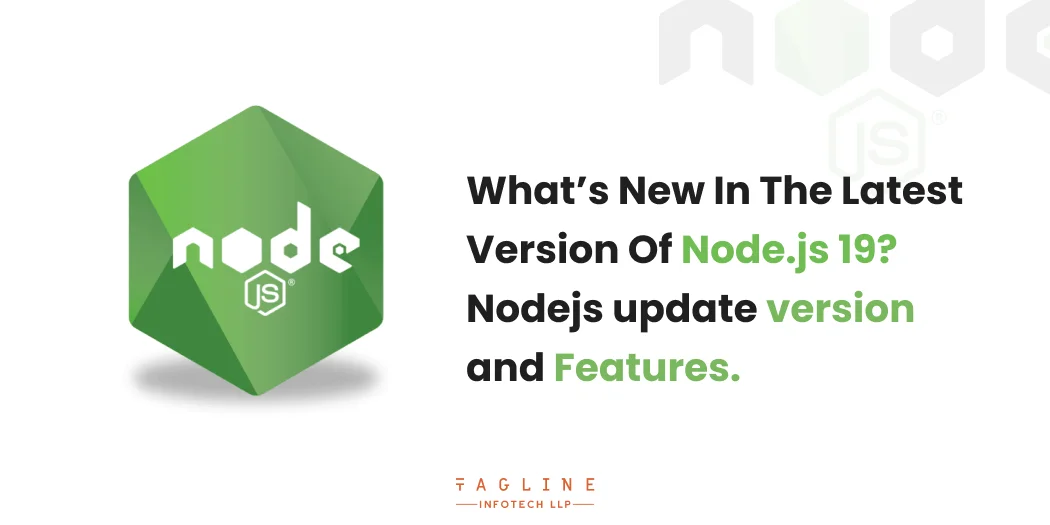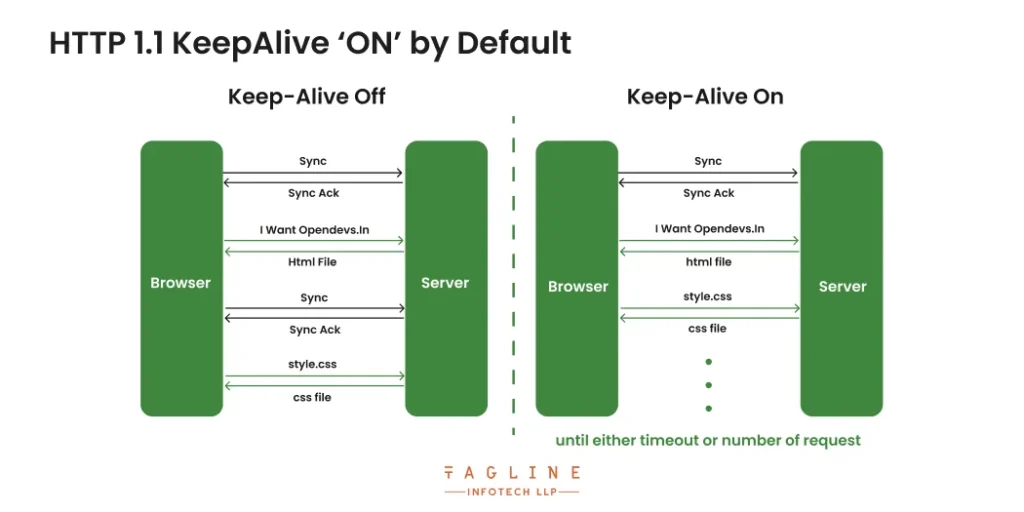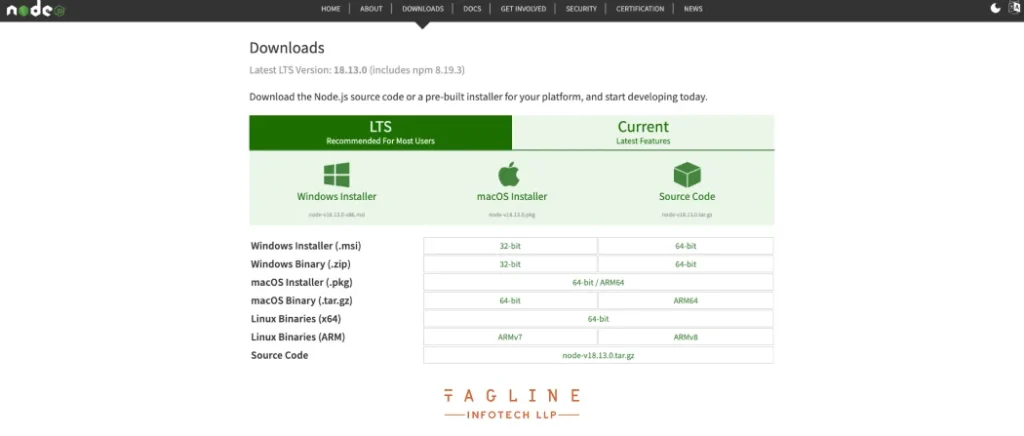Finance & IT Email Marketing: A Data-Driven Approach
February 2, 2026
Home >> Node.JS >> What’s New In The Latest Version Of Node.js 19? Nodejs update version and Features.

The Node.js team has never shied away from keeping users up to date on the Node.js latest version and its features. If you are wondering if you can run the Node.js update command to get the latest version, then here you will find the answers. Following the significant success of Node 18. The Node.js community has returned with the latest version of Node.js, Node.js 19. We will discuss the latest node version 19 and what’s New in Node 19 features and updates in this blog post. We will discuss the latest version of Node js and what’s new in Node.js 19, including its features and updates. Additionally, we provide consolidated information on the changes that Node.js 19 has introduced for the developer community, as well as the impact on existing Node 18 after the release of Node v19.
We know that the Node.js team never fails to surprise us, and they have followed in their footsteps this year by keeping the Node 19 release date on October 18, 2022, which makes this year a great point of discussion among developers. We know that the Node adheres to the even conventions, making all even versions stable and LTS (Long-Term-Support.) As a result, the odd versions are now stable. Stay up-to-date with the latest release of Node.js! Learn about the new features and improvements in Node js current version. Upgrade now for enhanced performance.
When talking about node versions, Node -watch, which was introduced as a direct competitor to nodemon, has been a standard tool for watching anything but has been primarily used for Nodejs projects, but you can now easily use the code given below:
$ node --watch index.js
This code will automatically restart the server or the script if any changes are made to the file. You will see the NodeJs latest version includes plenty of features this is one of them. This feature is available in v19.0.0.

As we all know, HTTP operates on TCP, implying that the underlying protocol is TCP, and TCP connections are costly to establish. Previously, each HTTP request was executed on a new TCP connection. However, it is now possible to use a single TCP connection for multiple HTTP requests. However, Google API on the same domain would require a separate connection.
As a result, we can conclude that after the release of Node.js 19, if you send a request to Node.js 19, the KeepAlive header will be set to ON, allowing you to reuse the TCP connection. Nonetheless, the default keep-alive duration is set to 5 seconds to avoid bloating the server connection.
In addition, the developer will now be able to parse the server’s Keep-Alive response. This header also informs the client of the cost of remaining connected. Furthermore, when close() is called, the Node.js HTTP server will automatically disconnect idle clients who use HTTP Keep-Alive to reuse the connection.
The main advantage of this feature is that if it becomes stable, it will improve network I/O performance with Node.js.
Node.js now supports WebCrypto, a standard cryptographic API for the web platform. The Stable WebCrypto provides a safe and efficient method for handling cryptographic operations. This WebCrypto API is available in Node.js worldwide and can be accessed via the crypto.web crypto global object.
The Stable WebCrypto also has a few exceptions, which are Ed25519, Ed448, X25519, and X448.
The -experimental-specifier-resolution flag is no longer supported by Node.js. Custom loaders can help us achieve this functionality.
The team removed support for DTrace/SystemTap/ETW in v19.0.0 with the intent and reason of resource prioritisation. In the absence of a clear plan to support these tools, the team concluded that the complexity of keeping support updated is not worth the effort.
V8, the underlying CC++ Engine that runs JavaScript, has been updated to 10.7 as part of Chromium 107. As a result, this version introduces a new Javascript API feature: Intl.NumberFormat.
“Authenticating REST APIs: 5 fundamental strategies”
– Also Read Article
llhttp has been upgraded to 8.1.0. This version makes numerous changes to the llhttp API, including the addition of new callbacks and the ability to pause all callbacks.
Although the NPM version included in the Node.js 18 line is the same one included in Node.js 19. Version 8.6.0 of Node.js NPM was the first to be released. As a result, new updates keep NPM up to date.
In contrast to the previous release, Node.js 19 includes significant changes or updates to the supported platforms. The standard requirements listed in BUILDING.md have not changed, but any operating systems that have reached their end of life will no longer be supported.
After the release of the most recent Node.js 19, Node.js 18 becomes LTS (Long Term Support) on October 25, 2022, establishing the transition of Node.js 18.x to LTS under the codename ‘Hydrogen.’
The Active 18.x release is placed in the ‘Active LTS’ category and will remain there until October 2923, after which it will be moved to the ‘Maintenance’ category until the end of April 2025.
The node latest version of Node 19 includes the ‘fetch,’ which was created from the experimental flag in Nodejs 18. So, you can now use Nodejs directly without using Node fetch or any other third-party library.
AWS Lambda now supports Node.js 18 as a managed runtime and container base image, following the release of Node.js 19. Many new features are now available to developers, including the upgrade of the bundled AWS SDK for javascript to v3 and improved support for deploying ES modules using Lambda layers.
It also helps to improve the Node.js 18 language, including the experimental ‘fetch’ API. Because the Node.js community adheres to the even convention, this Node 19 version or the node latest version is an odd-number release, and as such, it is not stable but experimental. Furthermore, Node.js 14 will reach the end of its lifecycle in April 2023; thus, upgrading to the most recent Node.js version is recommended to receive and enjoy the most recent features and benefits.
When it comes to upgrading, many product owners have struggled to decide between Node 18 and Node 19. Are you trying to figure out how to install the latest version of NodeJs then you are at the right place. Some argue that only the LTS versions should be required for product owners to upgrade to. However, if you are concerned about the latest Node 19 update and want to reap the benefits that Node js latest version Node 19 brings to the table, you must upgrade to the most recent version of Node. You can upgrade to Node.js 19 on your Linux systems in three different ways. Here’s a step-by-step guide to upgrading to Node 19.
You can use the npm NodeJs update version command to easily update the version of the current node version. The most preferred method of upgrading to the latest Node version is to use the Node Version Manager, which is also useful for managing or handling multiple Node.js versions at the same time.
The second method for upgrading to the latest version of Node.js is to use Node’s official Package Manager, which aids in the installation and management of package dependencies. Node includes the NPM with its installation, so if you have Node.js installed, you will have an NPM. You can also check the version of Node.js that is currently running on your system and instal the most recent one. Using the n module, you can easily manage Node.js versions.
Installing the latest version:
Update to Node js 19 with Binary Packages on Linux Systems

To begin the upgrade to Node 19, go to the Node js Download Page, where you can find all of the available options for upgrading to any version that is suitable. For the latest version of Node.js 19, you can either download the source code or use a pre-built installer.
Navigate to Node’s official downloads page to find a list of all available packages. For the LTS versions or the most recent release, you can download the source code or a pre-built installer.
You can either download the package from your browser or find the required version number and enter it into the wget command:
wget https://nodejs.org/dist/v19.2.0/node-v19.2.0-linux-x64.tar.xz
Then, instal xz-utils, which will be used to extract the binary package:
sudo apt-get install xz-utils
Use the following command to extract and instal the package:
sudo tar -C /usr/local --strip-components 1 -xJf
node-v19.2.0-linux-x64.tar.xz
Congratulations, Node.js 19 is now installed and ready to use on your Linux system.
This is all we know about the latest Node current version release, including Node v19. This blog must have provided you with valuable information about Node’s latest features and updates. If you still have questions about upgrading your project to the most recent Node version, or if you want to use Node for web application development, please contact Tagline. Then, you can hire a Node.js developer to assist you in making the final decision throughout your web application development journey.
After the release of the most recent Node.js 19, Node.js 18 becomes LTS (Long Term Support) on October 25, 2022, establishing the transition of Node.js 18.x to LTS under the codename 'Hydrogen.'
There are no obvious signs that anyone is using DTrace, SystemTap, or ETW.
The complexity of maintaining and supporting these tools has proven ineffective.

Digital Valley, 423, Apple Square, beside Lajamni Chowk, Mota Varachha, Surat, Gujarat 394101
D-401, titanium city center, 100 feet anand nagar road, Ahmedabad-380015
+91 9913 808 2851133 Sampley Ln Leander, Texas, 78641
52 Godalming Avenue, wallington, London - SM6 8NW